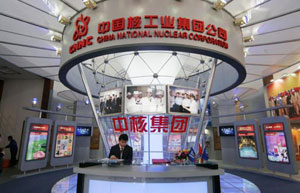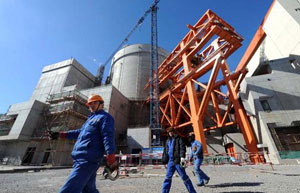Report calls for building inland nuclear power stations
Updated: 2014-06-27 07:35
By WU WENCONG (China Daily)
|
|||||||||||
China should vigorously develop nuclear energy and restart the plan to build nuclear power stations inland to reduce the nation's high energy consumption per unit of gross domestic product and clear smog and haze, said a report released on Thursday.
The Report on the Development of China's Eco-Cities (2014), produced by the Chinese Academy of Social Sciences, said China's primary energy consumption in 2012 was 3.62 billion metric tons of standard coal, or 20 percent of the world's total consumption.
China creates 14,000 yuan ($2,250) of GDP when burning one ton of standard coal. The figure is the equivalent of 25,000 yuan for the global average, 31,000 yuan for the Unites States, and 50,000 yuan for Japan, the report said.
It provided the ranking of 116 major Chinese cities based on their energy consumption per unit of GDP in 2012. Urumqi, capital of the Xinjiang Uygur autonomous region, is at the bottom of the list, generating only 4,184 yuan of GDP per ton of standard coal. Huangshan, Anhui province, tops the list at 22,371 yuan, which is still below the global average.
China consumed about half of the world's coal in 2012. Half of the consumption was at its thermal power stations, a major discharger of airborne pollutants. As for hydropower, the country has already developed 46 percent of the 500 million kilowatts that is considered the total that can be exploited.
In consequence, the report suggests restarting the plan to build nuclear power stations inland and reducing the number of thermal power stations to achieve greener urbanization.
"Setting up nuclear reactors only along the coast cannot fulfill inland cities' growing thirst for green energy and the sustainability of the power network during extreme weather," said Chen Xiaoqiu, deputy chief engineer of the Nuclear and Radiation Safety Center in the Ministry of Environmental Protection.
Chen said developing inland nuclear power plants would be an effective method for optimizing energy distribution and should be considered a necessity for clearing smog and improving air quality in many regions.
However, some experts strongly oppose the idea of developing inland nuclear power stations.
Wang Yinan, a researcher at the State Council's Development Research Center, said the latest research has noted that a lack of cooling water is a major constraint on operating nuclear stations in Europe and the United States.
This problem could be even tougher for such a thirsty country as China, whose per capita share of freshwater resources is one-fourth of the world average, Wang wrote in an article published in April in China Energy News.
|
 |
 |
| CGN sounds confident note on Turkish plant |
Related Stories
Nuclear plant deal with UK announced 2014-06-18 02:57
Railways, nuclear power on agenda of Li's European visit 2014-06-13 07:23
China to accelerate nuclear power development 2014-06-17 11:02
China, Italy in nuclear power cooperation 2014-06-12 14:15
China schedules new nuclear power reactors 2014-05-29 21:51
Today's Top News
Prime London properties lure investors
FIFA bans Suarez for 4 months
Tycoon criticized for charity in NY
50 trapped Chinese back to Baghdad
Northern Iraqis flee their home, avoiding Sunni millitans
DPRK test-fires newly developed missiles
RIMPAC drill not window-dressing for China-US ties
Li puts China-UK ties on new level
Hot Topics
Lunar probe , China growth forecasts, Emission rules get tougher, China seen through 'colored lens', International board,
Editor's Picks

|

|

|

|

|

|





